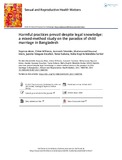| dc.contributor.author | Akter, Sayema | |
| dc.contributor.author | Williams, Chloe | |
| dc.contributor.author | Talukder, Animesh | |
| dc.contributor.author | Islam, Muhammed Nazmul | |
| dc.contributor.author | Escallon, Juanita Vasquez | |
| dc.contributor.author | Sultana, Tania | |
| dc.contributor.author | Kapil, Neha | |
| dc.contributor.author | Sarker, Malabika | |
| dc.date.accessioned | 2022-06-20T08:25:29Z | |
| dc.date.available | 2022-06-20T08:25:29Z | |
| dc.date.copyright | 2021 | |
| dc.date.issued | 2021-02-24 | |
| dc.identifier.citation | Akter, S., Williams, C., Talukder, A., Islam, M. N., Escallon, J. V., Sultana, T., . . . Sarker, M. (2022). Harmful practices prevail despite legal knowledge: A mixed-method study on the paradox of child marriage in Bangladesh. Sexual and Reproductive Health Matters, 29(2) doi:10.1080/26410397.2021.1885790 | en_US |
| dc.identifier.uri | http://hdl.handle.net/10361/17004 | |
| dc.description | This article was published in the Sexual and Reproductive Health Matters by Taylor and Francis [© 2021 The Author(s). Published by Informa UK Limited, trading as Taylor & Francis Group] and the definite version is available at: https://doi.org/10.1080/26410397.2021.1885790 The Journal's website is at: https://www.tandfonline.com/doi/full/10.1080/26410397.2021.1885790 | en_US |
| dc.description.abstract | Child marriage is a globally recognised human rights violation that disproportionately affects
girls, especially in developing countries. It has serious negative consequences on girls’ physical, mental,
sexual, and reproductive health and rights. Although well-pronounced laws against child marriage were
enacted in Bangladesh, the practice remains a significant challenge. Lack of law enforcement and persistent
social norms ultimately allow child marriage to persist around the country. Social norms have an impact on
the prevalent attitudes toward child marriage. Therefore, this mixed-method study aimed to explore the
legal knowledge, perception, and practice of child marriage in Bangladesh. This study was part of a broader
evaluation of a UNICEF media programme. Adolescent boys and girls aged between 10 and 19 years and
their parents were interviewed in three Bangladeshi districts. All the respondents were aware of the legal age
of marriage and knew that child marriage is punishable by law. This study illuminated the reasons,
including early marriage among boys, poverty, dowry, and sexual harassment. Communities and
policymakers need to be engaged to trigger larger structural and cultural changes to remedy the harmful
social norm and its practice | en_US |
| dc.language.iso | en_US | en_US |
| dc.publisher | Taylor & Francis | en_US |
| dc.relation.uri | https://www.tandfonline.com/doi/full/10.1080/26410397.2021.1885790 | |
| dc.subject | Bangladesh | en_US |
| dc.subject | Child marriage | en_US |
| dc.subject | Law | en_US |
| dc.subject | Rights | en_US |
| dc.subject | Sexual harassment | en_US |
| dc.title | Harmful practices prevail despite legal knowledge: A mixed-method study on the paradox of child marriage in Bangladesh | en_US |
| dc.type | Thesis | en_US |
| dc.description.version | Published | |
| dc.contributor.department | Brac James P. Grant School of Public Health | |
| dc.identifier.doi | https://doi.org/10.1080/26410397.2021.1885790 | |
| dc.relation.journal | Published | |

